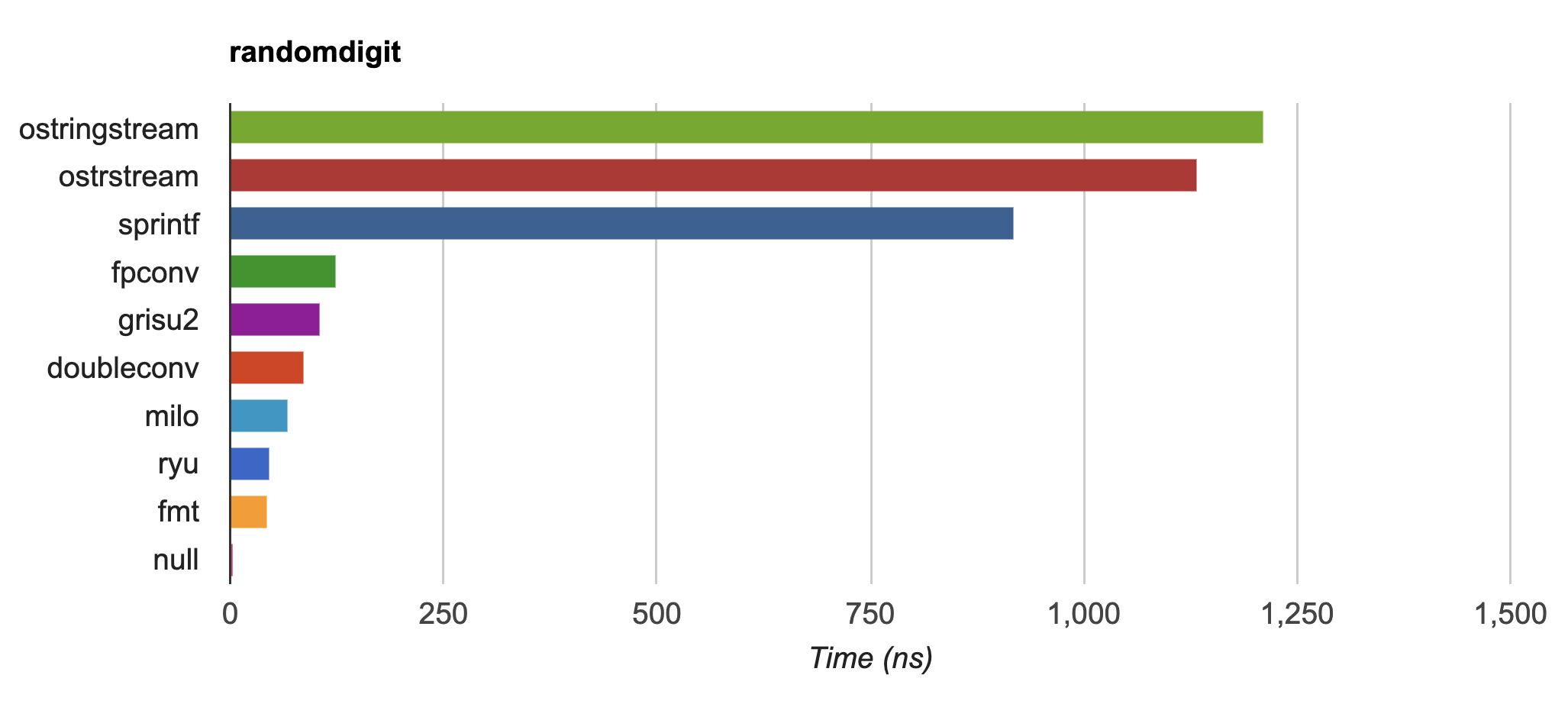{fmt} is an open-source formatting library providing a fast and safe alternative to C stdio and C++ iostreams.
If you like this project, please consider donating to one of the funds that help victims of the war in Ukraine: https://www.stopputin.net/.
Q&A: ask questions on StackOverflow with the tag fmt.
Try {fmt} in Compiler Explorer.
- Simple format API with positional arguments for localization
- Implementation of C++20 std::format and C++23 std::print
- Format string syntax similar to Python's format
- Fast IEEE 754 floating-point formatter with correct rounding, shortness and round-trip guarantees using the Dragonbox algorithm
- Portable Unicode support
- Safe printf implementation including the POSIX extension for positional arguments
- Extensibility: support for user-defined types
- High performance: faster than common standard library
implementations of
(s)printf, iostreams,to_stringandto_chars, see Speed tests and Converting a hundred million integers to strings per second - Small code size both in terms of source code with the minimum
configuration consisting of just three files,
core.h,format.handformat-inl.h, and compiled code; see Compile time and code bloat - Reliability: the library has an extensive set of tests and is continuously fuzzed
- Safety: the library is fully type-safe, errors in format strings can be reported at compile time, automatic memory management prevents buffer overflow errors
- Ease of use: small self-contained code base, no external dependencies, permissive MIT license
- Portability with consistent output across platforms and support for older compilers
- Clean warning-free codebase even on high warning levels such as
-Wall -Wextra -pedantic - Locale independence by default
- Optional header-only configuration enabled with the
FMT_HEADER_ONLYmacro
See the documentation for more details.
Print to stdout (run)
#include <fmt/core.h>
int main() {
fmt::print("Hello, world!\n");
}Format a string (run)
std::string s = fmt::format("The answer is {}.", 42);
// s == "The answer is 42."Format a string using positional arguments (run)
std::string s = fmt::format("I'd rather be {1} than {0}.", "right", "happy");
// s == "I'd rather be happy than right."Print dates and times (run)
#include <fmt/chrono.h>
int main() {
auto now = std::chrono::system_clock::now();
fmt::print("Date and time: {}\n", now);
fmt::print("Time: {:%H:%M}\n", now);
}Output:
Date and time: 2023-12-26 19:10:31.557195597
Time: 19:10
Print a container (run)
#include <vector>
#include <fmt/ranges.h>
int main() {
std::vector<int> v = {1, 2, 3};
fmt::print("{}\n", v);
}Output:
[1, 2, 3]
Check a format string at compile time
std::string s = fmt::format("{:d}", "I am not a number");This gives a compile-time error in C++20 because d is an invalid
format specifier for a string.
Write a file from a single thread
#include <fmt/os.h>
int main() {
auto out = fmt::output_file("guide.txt");
out.print("Don't {}", "Panic");
}This can be 5 to 9 times faster than fprintf.
Print with colors and text styles
#include <fmt/color.h>
int main() {
fmt::print(fg(fmt::color::crimson) | fmt::emphasis::bold,
"Hello, {}!\n", "world");
fmt::print(fg(fmt::color::floral_white) | bg(fmt::color::slate_gray) |
fmt::emphasis::underline, "Olá, {}!\n", "Mundo");
fmt::print(fg(fmt::color::steel_blue) | fmt::emphasis::italic,
"你好{}!\n", "世界");
}Output on a modern terminal with Unicode support:
| Library | Method | Run Time, s |
|---|---|---|
| libc | printf | 0.91 |
| libc++ | std::ostream | 2.49 |
| {fmt} 9.1 | fmt::print | 0.74 |
| Boost Format 1.80 | boost::format | 6.26 |
| Folly Format | folly::format | 1.87 |
{fmt} is the fastest of the benchmarked methods, ~20% faster than
printf.
The above results were generated by building tinyformat_test.cpp on
macOS 12.6.1 with clang++ -O3 -DNDEBUG -DSPEED_TEST -DHAVE_FORMAT, and
taking the best of three runs. In the test, the format string
"%0.10f:%04d:%+g:%s:%p:%c:%%\n" or equivalent is filled 2,000,000
times with output sent to /dev/null; for further details refer to the
source.
{fmt} is up to 20-30x faster than std::ostringstream and sprintf on
IEEE754 float and double formatting
(dtoa-benchmark) and faster
than double-conversion
and ryu:
The script bloat-test.py from format-benchmark tests compile
time and code bloat for nontrivial projects. It generates 100 translation units
and uses printf() or its alternative five times in each to simulate a
medium-sized project. The resulting executable size and compile time (Apple
clang version 15.0.0 (clang-1500.1.0.2.5), macOS Sonoma, best of three) is shown
in the following tables.
Optimized build (-O3)
| Method | Compile Time, s | Executable size, KiB | Stripped size, KiB |
|---|---|---|---|
| printf | 1.6 | 54 | 50 |
| IOStreams | 25.9 | 98 | 84 |
| fmt 83652df | 4.8 | 54 | 50 |
| tinyformat | 29.1 | 161 | 136 |
| Boost Format | 55.0 | 530 | 317 |
{fmt} is fast to compile and is comparable to printf in terms of per-call
binary size (within a rounding error on this system).
Non-optimized build
| Method | Compile Time, s | Executable size, KiB | Stripped size, KiB |
|---|---|---|---|
| printf | 1.4 | 54 | 50 |
| IOStreams | 23.4 | 92 | 68 |
| {fmt} 83652df | 4.4 | 89 | 85 |
| tinyformat | 24.5 | 204 | 161 |
| Boost Format | 36.4 | 831 | 462 |
libc, lib(std)c++, and libfmt are all linked as shared libraries
to compare formatting function overhead only. Boost Format is a
header-only library so it doesn't provide any linkage options.
Please refer to Building the library for instructions on how to build the library and run the unit tests.
Benchmarks reside in a separate repository, format-benchmarks, so to run the benchmarks you first need to clone this repository and generate Makefiles with CMake:
$ git clone --recursive https://github.com/fmtlib/format-benchmark.git
$ cd format-benchmark
$ cmake .
Then you can run the speed test:
$ make speed-test
or the bloat test:
$ make bloat-test
clang-tidy v17 (not yet
released) provides the
modernize-use-std-print
check that is capable of converting occurrences of printf and
fprintf to fmt::print if configured to do so. (By default it
converts to std::print.)
- 0 A.D.: a free, open-source, cross-platform real-time strategy game
- AMPL/MP: an open-source library for mathematical programming
- Apple's FoundationDB: an open-source, distributed, transactional key-value store
- Aseprite: animated sprite editor & pixel art tool
- AvioBook: a comprehensive aircraft operations suite
- Blizzard Battle.net: an online gaming platform
- Celestia: real-time 3D visualization of space
- Ceph: a scalable distributed storage system
- ccache: a compiler cache
- ClickHouse: an analytical database management system
- Contour: a modern terminal emulator
- CUAUV: Cornell University's autonomous underwater vehicle
- Drake: a planning, control, and analysis toolbox for nonlinear dynamical systems (MIT)
- Envoy: C++ L7 proxy and communication bus (Lyft)
- FiveM: a modification framework for GTA V
- fmtlog: a performant fmtlib-style logging library with latency in nanoseconds
- Folly: Facebook open-source library
- GemRB: a portable open-source implementation of Bioware's Infinity Engine
- Grand Mountain Adventure: a beautiful open-world ski & snowboarding game
- HarpyWar/pvpgn: Player vs Player Gaming Network with tweaks
- KBEngine: an open-source MMOG server engine
- Keypirinha: a semantic launcher for Windows
- Kodi (formerly xbmc): home theater software
- Knuth: high-performance Bitcoin full-node
- libunicode: a modern C++17 Unicode library
- MariaDB: relational database management system
- Microsoft Verona: research programming language for concurrent ownership
- MongoDB: distributed document database
- MongoDB Smasher: a small tool to generate randomized datasets
- OpenSpace: an open-source astrovisualization framework
- PenUltima Online (POL): an MMO server, compatible with most Ultima Online clients
- PyTorch: an open-source machine learning library
- quasardb: a distributed, high-performance, associative database
- Quill: asynchronous low-latency logging library
- QKW: generalizing aliasing to simplify navigation, and execute complex multi-line terminal command sequences
- redis-cerberus: a Redis cluster proxy
- redpanda: a 10x faster Kafka® replacement for mission-critical systems written in C++
- rpclib: a modern C++ msgpack-RPC server and client library
- Salesforce Analytics Cloud: business intelligence software
- Scylla: a Cassandra-compatible NoSQL data store that can handle 1 million transactions per second on a single server
- Seastar: an advanced, open-source C++ framework for high-performance server applications on modern hardware
- spdlog: super fast C++ logging library
- Stellar: financial platform
- Touch Surgery: surgery simulator
- TrinityCore: open-source MMORPG framework
- 🐙 userver framework: open-source asynchronous framework with a rich set of abstractions and database drivers
- Windows Terminal: the new Windows terminal
If you are aware of other projects using this library, please let me know by email or by submitting an issue.
So why yet another formatting library?
There are plenty of methods for doing this task, from standard ones like the printf family of function and iostreams to Boost Format and FastFormat libraries. The reason for creating a new library is that every existing solution that I found either had serious issues or didn't provide all the features I needed.
The good thing about printf is that it is pretty fast and readily
available being a part of the C standard library. The main drawback is
that it doesn't support user-defined types. printf also has safety
issues although they are somewhat mitigated with __attribute__
((format (printf,
...)) in
GCC. There is a POSIX extension that adds positional arguments required
for
i18n
to printf but it is not a part of C99 and may not be available on some
platforms.
The main issue with iostreams is best illustrated with an example:
std::cout << std::setprecision(2) << std::fixed << 1.23456 << "\n";which is a lot of typing compared to printf:
printf("%.2f\n", 1.23456);Matthew Wilson, the author of FastFormat, called this "chevron hell". iostreams don't support positional arguments by design.
The good part is that iostreams support user-defined types and are safe although error handling is awkward.
This is a very powerful library that supports both printf-like format
strings and positional arguments. Its main drawback is performance.
According to various benchmarks, it is much slower than other methods
considered here. Boost Format also has excessive build times and severe
code bloat issues (see Benchmarks).
This is an interesting library that is fast, safe and has positional arguments. However, it has significant limitations, citing its author:
Three features that have no hope of being accommodated within the current design are:
- Leading zeros (or any other non-space padding)
- Octal/hexadecimal encoding
- Runtime width/alignment specification
It is also quite big and has a heavy dependency, on STLSoft, which might be too restrictive for use in some projects.
This is not a formatting library but I decided to include it here for
completeness. As iostreams, it suffers from the problem of mixing
verbatim text with arguments. The library is pretty fast, but slower on
integer formatting than fmt::format_to with format string compilation
on Karma's own benchmark, see Converting a hundred million integers to
strings per
second.
{fmt} is distributed under the MIT license.
The Format String Syntax section in the documentation is based on the one from Python string module documentation. For this reason, the documentation is distributed under the Python Software Foundation license available in doc/python-license.txt. It only applies if you distribute the documentation of {fmt}.
The {fmt} library is maintained by Victor Zverovich (vitaut) with contributions from many other people. See Contributors and Releases for some of the names. Let us know if your contribution is not listed or mentioned incorrectly and we'll make it right.
To report a security issue, please disclose it at security advisory.
This project is maintained by a team of volunteers on a reasonable-effort basis. As such, please give us at least 90 days to work on a fix before public exposure.



